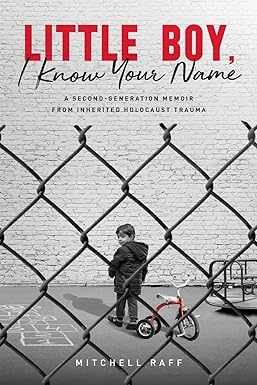Little Boy, I Know Your Name
A Second Generational Memoir from Inherited Holocaust Trauma
Rejecting a family tradition of silence to catalog inherited and individual wounds, Little Boy, I Know Your Name is a powerful memoir.
Mitchell Raff’s forthright memoir Little Boy, I Know Your Name centers on his relationships with the four Holocaust survivors who raised him, showing how their trauma impacted his life.
Four-year-old Raff didn’t remember his mother. He lived in Los Angeles with his Uncle Issa and Aunt Sally. His father, nearly catatonic after surviving Dachau, lived nearby. One day, his mother, who’d also survived the Nazi regime, showed up at his preschool, wanting him to come live with her and his little sister. Fascinated by news that he had a sister, Raff moved in with his violent, traumatized mother, who ended up kidnapping him during a pending custody case and taking him to Israel.
The chaos that followed is mirrored in an impressive literary strategy: the book’s narrative structure is a chronology interrupted by frequent flashbacks and flash-forwards. This structure also echoes the book’s central theme about Holocaust trauma crossing generational boundaries. Time shifts are signaled by paragraph breaks, insertion of dates, and other transitional devices that make it easy to follow the story, even when the shifts are rapid and profound.
The quick shifts in time also contribute to the book’s urgent pace, creating active suspense; when extraordinary future outcomes are revealed in a flash-forward, it generates a desire to know how in the world those outcomes could have occurred. Early in the book, it’s revealed that Raff’s cherished son died as a young man, but the particulars of that tragedy are withheld until the final chapter. In a similar pattern, Raff questioned how his mother’s silence and rage continued even after her death to create heartbreak in his sister’s life. When that question is answered many pages later, it’s satisfying.
The flash-forwards also enhance the memoir’s reflective moments. When conversations with a therapist Raff consulted as a sober, older man are interspersed with scenes from the active addictions of his youth, these conversations open up ideas about motivations for Raff’s self-destructive behavior as he continued his family’s tradition of silence, compartmentalizing his different identities. Returning to the US as a teenager, he once again became Issa and Sally’s beloved boy, but another part of him was still his mother’s whipping post. As an adult, he was a good husband and a loving father, as well as a sex addict and drug addict; the latter identities he kept secret.
Eschewing research on trauma impact in general, epigenetics, or the specifics of Holocaust trauma, the book relies on personal experiences as its evidence. Further, the dramatic contrasts between Raff’s mother’s violence and his father’s extreme passivity suggest that each survivor’s way of coping is unique, and each survivor’s descendants will therefore experience different impacts. This family’s common coping mechanism was silence; elegant prose is devoted to their belief that silence could “cauterize their wounds,” even while breaking from tradition to disclose Raff’s own traumas and transgressions.
Little Boy, I Know Your Name is a memoir about tragedy, lasting trauma, and recovery that is rooted in a family legacy of surviving the Holocaust.
Reviewed by
Michele Sharpe
Disclosure: This article is not an endorsement, but a review. The publisher of this book provided free copies of the book and paid a small fee to have their book reviewed by a professional reviewer. Foreword Reviews and Clarion Reviews make no guarantee that the publisher will receive a positive review. Foreword Magazine, Inc. is disclosing this in accordance with the Federal Trade Commission’s 16 CFR, Part 255.

